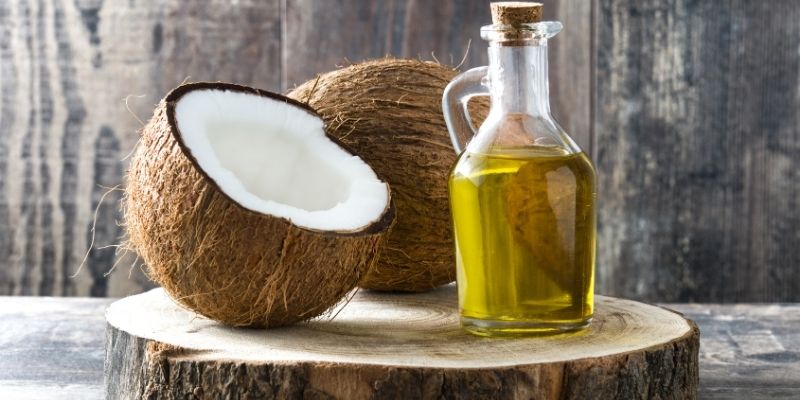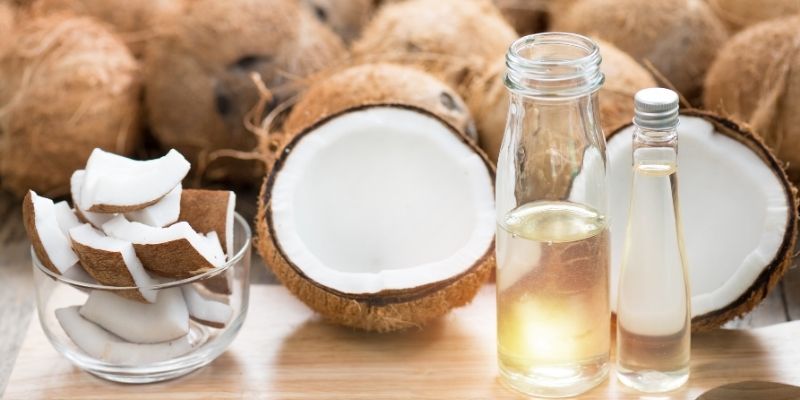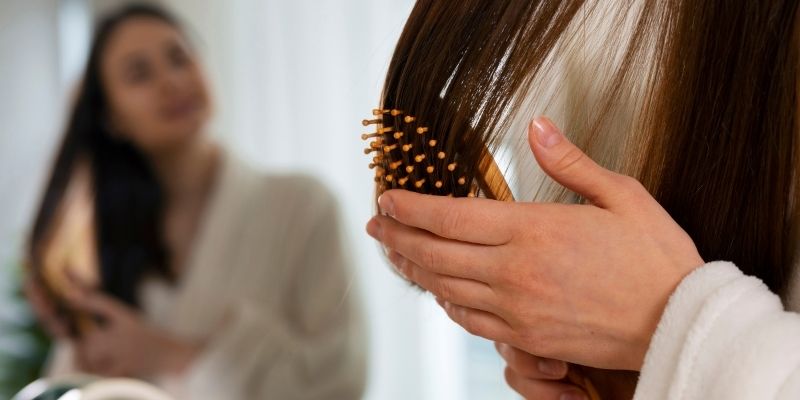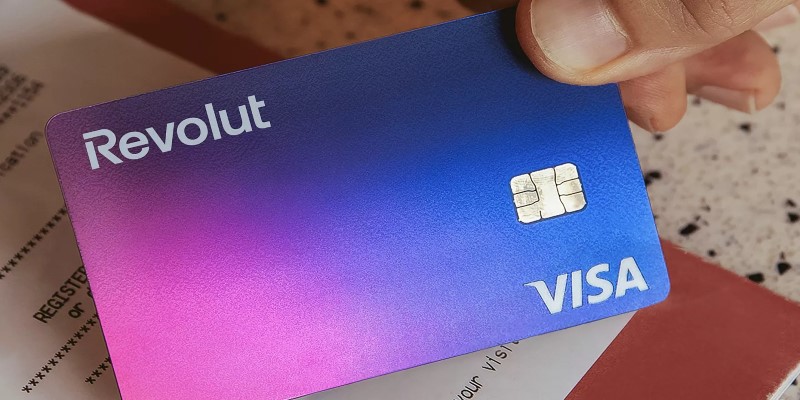The Role of Coconut Oil in Promoting Hair Growth
Ancient beauty and wellness practices have relied on coconut oil, particularly in tropical locations with plentiful coconuts. Due to its many health advantages, coconut oil is renowned worldwide as a natural hair treatment, especially for hair growth. Natural hair care enthusiasts like its variety, affordability, and availability. Genetics, food, environment, and hair care affect hair development. Coconut oil has unique properties that may maintain a healthy scalp and boost hair development over time. Coconut oil promotes hair development. This article discusses its advantages, downsides, and practical application.

Benefits of Coconut Oil in Promoting Hair Growth
Deep Hairshaft Penetration:
Coconut oil penetrates hair shafts better than other oils. Molecular structure, especially medium-chain fatty acids (MCFAs), primarily lauric acid, causes this. Unlike bigger molecules in different oils, the hair cortex can absorb these fatty acids. Deep permeation strengthens hair from the inside, preventing environmental, chemical, and heat damage. It also nourishes hair, avoiding dryness and brittleness, which cause breaking.
Scalp Wellness:
A healthy scalp supports hair development. Due to lauric acid, capric acid, and caprylic acid, coconut oil fights scalp infections. Dust, seborrheic dermatitis, and fungal infections may damage hair follicles and slow development. Coconut oil relieves inflammation itching, and adjusts scalp moisture. This promotes hair follicle growth and healthy strands.
Conditioner and moisturization:
Preventing hair loss requires moisture preservation. Coconut oil is Best for maintaining hair hydration. Emollients smooth the hair cuticle, decreasing frizz and making hair more straightforward to maintain. Coconut oil does not thicken up hair like commercial conditioners. Each strand is nourished, making it smoother, shinier, and more resistant to daily use.
Protein Loss Prevention:
Keratin, a protein, makes hair strong and elastic. Washing, sun exposure, and style may weaken hair by causing protein loss. Since coconut oil binds to hair proteins, studies suggest it may dramatically prevent protein loss. Coconut oil maintains the hair's protein structure during washing and combing, whether pre- or post-wash. These benefits are significant for chemically treated or color-damaged hair.
Activating Hair Follicles:
Regular coconut oil scalp massages enhance blood circulation and awaken dormant hair follicles. The scalp receives more oxygen and nutrients, enabling quicker and better hair development. Coconut oil massages may also relieve stress, which can cause hair loss.
Split-End and Frizz Protection:
Split ends and frizz cause hair loss. Coconut oil may solve these concerns by sealing the hair cuticle, softening rough edges, and minimizing friction. When applied lightly to the lengths, coconut oil prevents split ends and manages frizz, particularly in humid circumstances.
Protecting the sun:
Coconut oil's natural SPF of 4-5 provides minimal UV protection. Although it cannot substitute for sunscreen, it protects against sun-induced dryness and discolouration.

Coconut oil's hair growth drawbacks:
Coconut oil benefits many, but not all. Drawbacks may include:
- The thick coconut oil might leave a greasy residue if overapplied. This may make hair seem flat and lifeless, particularly fine or thin strands.
- Coconut oil may block pores on oily scalps, causing acne or discomfort. Proper washing prevents accumulation and keeps the scalp healthy.
- Coconut oil works well for dry and coarse hair, but fine or low-porosity hair may not. Such hair may have trouble absorbing oil, making it oily or sticky.
- Some individuals may have coconut oil allergies, while others are uncommon. Immediately stop using if redness, irritation, or swelling occur.
Ways to Use Coconut Oil:
Coconut oil is versatile. Some prominent ways are:
- Massage coconut oil over dry strands, concentrating on the scalp and ends, before washing. This pre-treatment prevents protein loss and shampooing-induced dryness.
- A little bit of coconut oil between your hands may be used as a leave-in conditioner on wet hair. This approach eliminates frizz and adds natural shine.
- Coconut oil should be warm and massaged into the scalp in circles, increasing circulation, relaxation, and hair follicle nutrition supply.
- DIY hair masks: Use coconut oil, honey, avocado, or yoghurt to nourish hair. Combining advantages include scalp moisturizing, strengthening, and relaxing.
Coconut Oil Use Tips:
- Coconut oil is concentrated, so start small. Try a teaspoon for medium-length hair and add more if needed. It may make hair oily or heavy if overused.
- Coconut oil must be applied to the scalp and hair ends, which require the most excellent attention. This moisturizer and antifungal protects the scalp and ends from dryness and broken ends.
- Heat coconut oil slightly before applying it for better absorption. Warm oil penetrates hair and scalp better, hydrating it. High temperatures damage oil nutrients, so prevent overheating.
- Before washing, apply coconut oil to hair 30 minutes before rinsing. This barrier reduces protein loss while washing and makes hair smoother and shinier.
- Regularly use coconut oil in your hair care regimen for significant effects. It may nourish and preserve hair without over-oiling it when used 12 times a week.
- Coconut oil is good, but overuse may cause product buildup, particularly in thin or greasy hair, restricted use and thorough shampooing.
- Upgrade DIY Hair Masks: Mix coconut oil with honey, yoghurt, or aloe vera to make a hair-nourishing mask.
- Store coconut oil in a cool, dry area to retain quality. Warm it carefully before use if it solidifies in colder temperatures.
- Using coconut oil sparingly, you may have healthier, shinier, and stronger hair.
Choice of Coconut Oil
How well coconut oil works depends on its quality. Look for:
- Virgin or extra virgin coconut oil contains more nutrients than processed coconut oil.
- Cold-Pressed: Coconut oil is extracted without heat to preserve its qualities.
- Organic and Chemical-Free: Pick organic coconut oil without additives, preservatives, or synthetic scents to protect your hair and scalp.
- Ensure the oil is in a dark glass container or opaque packaging to avoid light deterioration.
Conclusion
Coconut oil is best hair growth booster. Any hair care program needs it since it penetrates deeply, nourishes the scalp, and protects hair. Like any product, coconut oil should be used properly and tailored to specific hair types and requirements. Coconut oil, a balanced diet, and stress management may help you grow healthier, stronger, and longer hair. Consistency, patience, and comprehensive care unveil its potential.












